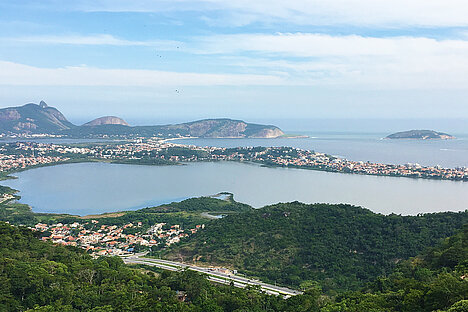- DE |
- EN
The green town of Ajja
Overview
For the Palestinian town Ajja, transitioning into a sustainable growth path was a result of a comprehensive vision by its municipal council backed up by the local population to build resilient municipal infrastructure that utilizes renewable energy sources and promotes sustainable management of the town’s resources.

Background
Ajja municipality is part of Jenin Governorate in the West Bank. With its population of 6000 inhabitants, this town is distinguished with dynamism, vitality and a momentum of daily commerce since it is a hub for many important entrepreneurial activities. In 2011, the local council was merely a village council providing traditional municipal services. As in the case of the other Palestinian municipalities, municipal services and infrastructure have collapsed in face of the Israeli military campaigns that spanned the years of the second Palestinian uprising (2000-2005).
Besides the deterioration of municipal services and infrastructure in the town, this phase has also witnessed increasing debt-rates among citizens and misuse of public funds, which led to the village council failing to fulfill its responsibilities. The council has thus opted to privatize the electricity service provision, however, this decision was rejected by the town’s inhabitants. The public dissatisfaction with the village council has eventually led to a decision to dissolve it. A municipal committee took over and has managed the town’s resources, stopped misuse of public funds as well as significantly developed the municipal infrastructure. Achieving these accomplishments within only three years has led to the decision by the Ministry of Local Administration to upgrade the local committee into a municipal council in 2016. From that point on, the municipal council has adopted a vision for sustainable and ecological development.
Objectives
Build resilient municipal infrastructure that utilizes renewable energy sources and promotes sustainable management of the town’s resources and inclusive job creation.

Activities
To achieve the aforementioned goal, Ajja municipality has planned and is implementing a wide spectrum of municipal projects that include:
- Construction of solar panels farms
- Construction of waste-water management system
- Public-private partnerships for waste-energy projects
- Promoting eco-tourism through the rehabilitation of hiking trails, reforestation, conducting training programs for the citizen on eco-tourism and bio-agriculture, construction of ecolodge, and supporting the manufacturing of bio-products by women in the local community.
- Rehabilitation of public buildings to improve their energy and climatic performance.
Effects
Constructing the solar farm and the associated provision of electricity on the one hand, and the upgrading of the municipal infrastructure on the other, has facilitated the inclusion of large areas of the town within the development zones. As a result, a number of economic enterprises (including factories for the production of indigenous plant products and animal farms) and SMEs were established in the town and the residential areas have expanded. These developments were associated with a remarkable job creation that benefited not only the local population, but also job seekers from neighbouring towns. Promoting women’s employment was also an integral part of the process that was accounted for in the booming job market.
The local municipal council has also adopted strategies and policies to promote and facilitate investment in renewable energy projects. So far, more than 50% of the energy consumption of local economic enterprises is provided by renewable energy sources- a reality that contributed to the comparative advantage of this town.
In the same vein, improving the business procedures in the town has built trust among investors to establish or relocate their economic enterprises to Ajja. The investment capital in the town has exceeded USD 14.000.000 since 2014.
Adopting a BoT[1] approach through public-private partnership to construct the solar farm has minimized the risk associated with the lack of technical know-how in the municipality as well as the risk of confiscating the public funds. This sustainable project is a revenue source since it saves 20% of the usual monthly electricity bill that the town used to pay for the Israeli electricity provider. This amount equals USD 100.000. Ajja has also reduced its ecological footprint by reducing its annual carbon emissions by 1400 Tons.
[1] Build Operate Transfer (BOT) is a form of project financing, wherein a private entity receives a concession from the private or public sector to finance, design, construct, own, and operate a facility stated in the concession contract.

Conclusions
Transforming Ajja into an ecologically and economically sustainable town was operationalized through a wide spectrum of municipal projects that fell under the umbrella of a comprehensive vision by its municipal council and its local populations. Public-private partnerships were key in the successful implementation of the municipal infrastructural projects including the construction of the solar farm.
further information
Published: 08/06/2020
Contact
Asem Qasem
Financial & Administrative Officer
Ajja Municipality, Palestine
Telephone: +970595990861



















